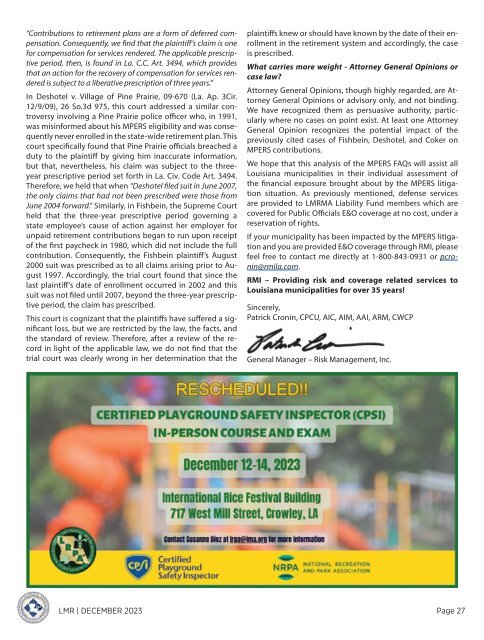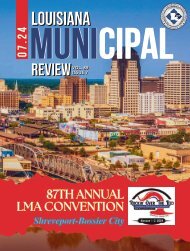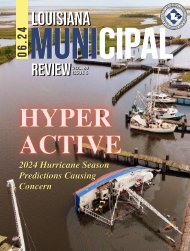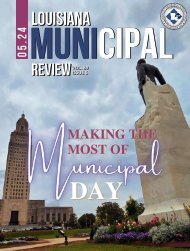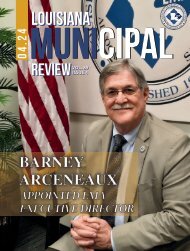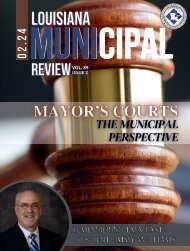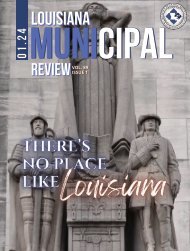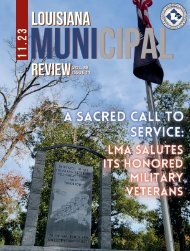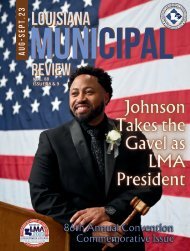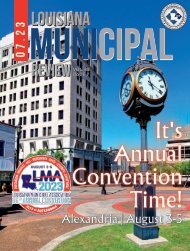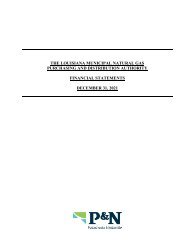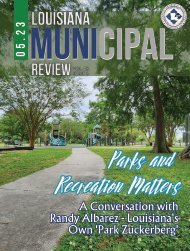December 2023
Create successful ePaper yourself
Turn your PDF publications into a flip-book with our unique Google optimized e-Paper software.
“Contributions to retirement plans are a form of deferred compensation.<br />
Consequently, we find that the plaintiff’s claim is one<br />
for compensation for services rendered. The applicable prescriptive<br />
period, then, is found in La. C.C. Art. 3494, which provides<br />
that an action for the recovery of compensation for services rendered<br />
is subject to a liberative prescription of three years.”<br />
In Deshotel v. Village of Pine Prairie, 09-670 (La. Ap. 3Cir.<br />
12/9/09), 26 So.3d 975, this court addressed a similar controversy<br />
involving a Pine Prairie police officer who, in 1991,<br />
was misinformed about his MPERS eligibility and was consequently<br />
never enrolled in the state-wide retirement plan. This<br />
court specifically found that Pine Prairie officials breached a<br />
duty to the plaintiff by giving him inaccurate information,<br />
but that, nevertheless, his claim was subject to the threeyear<br />
prescriptive period set forth in La. Civ. Code Art. 3494.<br />
Therefore, we held that when “Deshotel filed suit in June 2007,<br />
the only claims that had not been prescribed were those from<br />
June 2004 forward.” Similarly, in Fishbein, the Supreme Court<br />
held that the three-year prescriptive period governing a<br />
state employee’s cause of action against her employer for<br />
unpaid retirement contributions began to run upon receipt<br />
of the first paycheck in 1980, which did not include the full<br />
contribution. Consequently, the Fishbein plaintiff’s August<br />
2000 suit was prescribed as to all claims arising prior to August<br />
1997. Accordingly, the trial court found that since the<br />
last plaintiff’s date of enrollment occurred in 2002 and this<br />
suit was not filed until 2007, beyond the three-year prescriptive<br />
period, the claim has prescribed.<br />
This court is cognizant that the plaintiffs have suffered a significant<br />
loss, but we are restricted by the law, the facts, and<br />
the standard of review. Therefore, after a review of the record<br />
in light of the applicable law, we do not find that the<br />
trial court was clearly wrong in her determination that the<br />
plaintiffs knew or should have known by the date of their enrollment<br />
in the retirement system and accordingly, the case<br />
is prescribed.<br />
What carries more weight - Attorney General Opinions or<br />
case law?<br />
Attorney General Opinions, though highly regarded, are Attorney<br />
General Opinions or advisory only, and not binding.<br />
We have recognized them as persuasive authority, particularly<br />
where no cases on point exist. At least one Attorney<br />
General Opinion recognizes the potential impact of the<br />
previously cited cases of Fishbein, Deshotel, and Coker on<br />
MPERS contributions.<br />
We hope that this analysis of the MPERS FAQs will assist all<br />
Louisiana municipalities in their individual assessment of<br />
the financial exposure brought about by the MPERS litigation<br />
situation. As previously mentioned, defense services<br />
are provided to LMRMA Liability Fund members which are<br />
covered for Public Officials E&O coverage at no cost, under a<br />
reservation of rights.<br />
If your municipality has been impacted by the MPERS litigation<br />
and you are provided E&O coverage through RMI, please<br />
feel free to contact me directly at 1-800-843-0931 or pcronin@rmila.com.<br />
RMI – Providing risk and coverage related services to<br />
Louisiana municipalities for over 35 years!<br />
Sincerely,<br />
Patrick Cronin, CPCU, AIC, AIM, AAI, ARM, CWCP<br />
General Manager – Risk Management, Inc.<br />
LMR | DECEMBER <strong>2023</strong> Page 27


